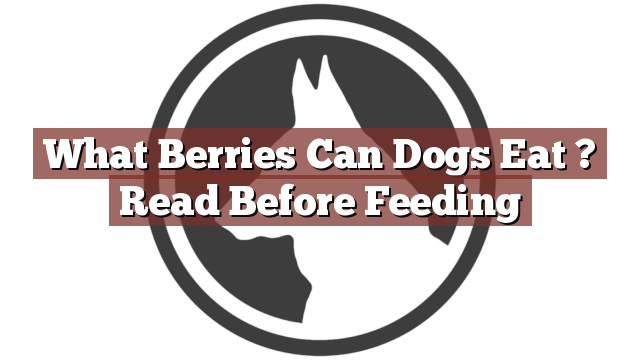Understanding Your Dog’s Dietary Needs
As a responsible pet owner, it is crucial to understand the dietary needs of your furry friend. Feeding your dog a well-balanced and nutritious diet is essential for their overall health and well-being. While dogs primarily thrive on a diet rich in meat and vegetables, incorporating certain fruits and berries can also provide them with added benefits. However, it is important to be cautious and informed about what berries are safe for dogs to consume.
What Berries Can Dogs Eat? Read Before Feeding
Can dogs eat berries? The answer is yes, but with some caveats. While many berries are safe for dogs to eat, some can be toxic and pose a serious risk to their health. It is essential to know which berries are safe for your canine companion before introducing them to their diet.
Some of the berries that are safe for dogs to eat include blueberries, strawberries, raspberries, and blackberries. These berries are not only delicious but also offer a range of health benefits to dogs. Blueberries, for example, are packed with antioxidants that help boost their immune system and improve cognitive function. Strawberries are a great source of vitamins and fiber, while raspberries and blackberries provide dogs with essential nutrients like Vitamin C and manganese.
However, it is important to remember that moderation is key. Berries should only be given to dogs as an occasional treat and should never replace their regular diet. It is also crucial to wash the berries thoroughly and remove any stems, leaves, or seeds that could potentially be harmful to your furry friend.
Pros and Cons of Feeding Berries to Dogs
Feeding berries to dogs can offer several benefits, but it is important to weigh these advantages against the potential risks. Some of the pros of including berries in your dog’s diet include their high antioxidant content, which helps protect against cell damage and supports a healthy immune system. Additionally, the fiber content in berries can aid in digestion and promote bowel regularity in dogs.
On the other hand, there are a few cons to consider. Certain berries, such as grapes and raisins, can be extremely toxic to dogs and should never be given to them under any circumstances. These fruits can cause kidney failure in dogs and can be fatal even in small quantities. It is crucial to be aware of which berries are safe and which are harmful to your furry friend to avoid any potential health risks.
Conclusion: Making Informed Choices for Your Canine Companion
In conclusion, while there are several berries that are safe for dogs to eat, it is important to exercise caution and make informed choices about what you feed your canine companion. Always consult with your veterinarian before introducing any new food into your dog’s diet, including berries. Remember to keep the portion size small and offer berries as an occasional treat rather than a regular meal replacement. By being aware of the potential risks and benefits, you can ensure that your furry friend enjoys the nutritious goodness of berries while staying safe and healthy.
Thank you for taking the time to read through our exploration of [page_title]. As every dog lover knows, our furry friends have unique dietary needs and responses, often varying from one canine to another. This is why it's paramount to approach any changes in their diet with caution and knowledge.
Before introducing any new treats or making alterations to your dog's diet based on our insights, it's crucial to consult with a veterinarian about [page_title]. Their expertise ensures that the choices you make are well-suited to your particular pet's health and well-being.
Even seemingly harmless foods can sometimes lead to allergic reactions or digestive issues, which is why monitoring your dog after introducing any new food item is essential.
The content provided here on [page_title] is crafted with care, thorough research, and a genuine love for dogs. Nevertheless, it serves as a general guideline and should not be considered a substitute for professional veterinary advice.
Always prioritize the expert insights of your veterinarian, and remember that the health and happiness of your furry companion come first.
May your journey with your pet continue to be filled with joy, love, and safe culinary adventures. Happy reading, and even happier snacking for your canine friend!

